US election 2012: Republican candidates
- Published
As the Republican presidential race enters the critical chapter of state caucuses and primaries, which begin in January 2012, who is running to face President Barack Obama as the Republican opponent in the race for the White House?
Despite regular fluctuations in opinion polls, the Republican field is made up of seven main candidates vying for the presidential nomination.
Here are the leading Republican contenders:
Mitt Romney
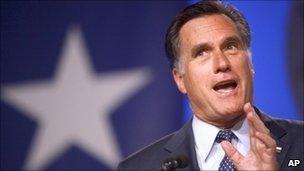
Mitt Romney, the wealthy former governor of Massachusetts, officially launched his second bid for the Republican presidential nomination on a farm in New Hampshire in June.
He entered the fray as the presumed front-runner, appearing at or near the top in early polling.
Mr Romney has maintained steady support in the months leading up to the first nominating contests, and experts have described him as the most electable of the candidates.
But he has failed to electrify the conservative base of the Republican party, and correspondents say that the race remains wide open in the key early voting states.
Mr Romney, son of former Michigan Governor George Romney, made his first bid for the presidency in 2008, after earning a fortune in corporate strategy and private equity.
But his considerable resources (he spent about $35m [£21.4m] of his own money before dropping out in February 2008) were not enough to overcome what others perceived as inconsistent messages, policy shifts and questions about his authenticity as a conservative.
Mr Romney seems to have learned lessons from 2008, and is casting himself as a serious grown-up in a Republican Party characterised in the 2010 mid-term elections by grassroots anger.
After his 2008 defeat, Mr Romney cautiously courted important political figures in key early primary states, including South Carolina and New Hampshire, the state he now calls home.
He raised money for many congressional and gubernatorial candidates - earning him much goodwill in the party - and has developed a reputation for being hard-working and loyal.
His financial expertise and impressive economic record in private industry, particularly in turning around troubled businesses, could be an asset as the economy continues to be the dominant issue in 2012.
But Mr Romney has several hurdles to overcome. As governor of the generally liberal state of Massachusetts, he reformed the state healthcare system - an overhaul that looks remarkably similar to the one President Barack Obama signed in 2010 in the face of united Republican opposition.
One of Mr Romney's first policy speeches of the 2012 campaign was devoted to explaining that although he believed the overhaul was right for Massachusetts, he would repeal it on a national level if elected president.
Mr Romney's Mormon roots could also present an issue, as the Republican primary contests in Iowa and South Carolina tend to be dominated by evangelical Christian conservatives who may be uncomfortable with his faith.
Ron Paul
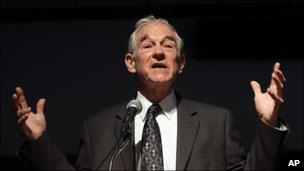
The Texas congressman has won a devoted following among libertarian-minded Republicans with his calls for a return to the gold standard, the abolition of the Federal Reserve and the Internal Revenue Service, and his staunch opposition - unusual in the Republican Party - to the war in Iraq and to American militarism in general.
Supporters of Mr Paul, an obstetrician, gained a reputation during the 2008 race for their enthusiasm for the candidate - as well as for their practice of disrupting rival candidates' rallies and press conferences.
Some of his backers also became known for espousing far-out conspiracy theories, such as the suggestion the US government was behind the 11 September 2001 terror attacks, tainting his movement in the eyes of the mainstream Republican electorate.
Mr Paul, 75, announced his candidacy in May in remarks that mixed anti-war cries with arguments for the legalisation of heroin and the end of federal flood and disaster insurance programmes.
He will bring to the race a legion of devoted followers who can organise and raise funds.
But to his detractors, Mr Paul is too eccentric and his ideas too fringe for them to take him seriously as a presidential hopeful.
It remains to be seen whether his rising profile in swing states such as Iowa will be reflected at the polls - a development that could upset the dynamic of the race as it moves into the primaries.
In July 2011, Mr Paul announced he would not stand again for his House seat, saying he wanted to remain focused on his presidential bid.
Rick Santorum
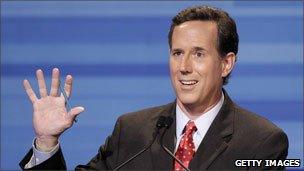
The former Pennsylvania Senator hopes to capitalise on his solid social conservative credentials. He last appeared on the ballot in 2006, when he lost his re-election bid by 17 points.
Polls have shown him in a distant seventh place in the race but just days before the first round of voting in Iowa - where Mr Santorum has campaigned relentlessly - opinion polls show some momentum gathering behind the candidate.
He has attacked rivals such as Ron Paul with gusto but he has a lot of ground to make up on the front-runners.
Newt Gingrich
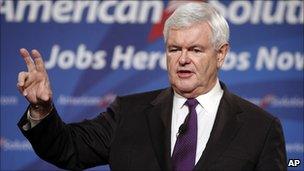
Mr Gingrich, the former speaker of the House of Representatives, announced he would be running against Mr Obama in 2012 on YouTube, Twitter, and in an interview on Fox News.
Since he left office 12 years ago, Mr Gingrich has built a broad network of conservative businesses and non-profit organisations, generating films, books and position papers, and has sought to align himself as an elder statesman and a creative source of conservative policy ideas.
He remains widely respected in the party for leading congressional Republicans out of 40 years in opposition in 1994, although he lost the speaker's gavel in 1998 after the party took significant losses.
In June 2011 his chances took a serious knock when senior members of his campaign team walked out, citing differences over strategy.
But Mr Gingrich made a roaring comeback in November, with surging poll ratings in Iowa, South Carolina and Florida - all key early voting states.
But Mr Gingrich has been criticised by fellow party members for having taken positions on several policy issues that they viewed as unpredictable or inconsistent with conservative principles.
For example, he attacked a plan popular among Republicans to slash and privatise a healthcare programme for the elderly.
Mr Gingrich can be both inflammatory and irascible - qualities Americans do not tend to see as presidential - and has a long record of undiplomatic quotes.
His three marriages may also haunt him in a 2012 campaign. His first wife has accused him of divorcing her while she was in hospital recovering from cancer.
Mr Gingrich was having an affair with a staffer (whom he later married) while he was leading the charge to impeach former President Bill Clinton over his affair with Monica Lewinsky.
Rick Perry
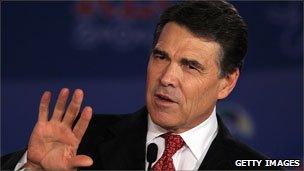
Rick Perry may have entered the race later than his rivals but he has spent months raising money in Texas, where he has been governor for 10 years.
He was the last of the candidates to formally launch a bid for the White House, making his announcement in the key primary state of South Carolina in August.
Mr Perry's mantra is small government and he can boast that he balanced the books in the second largest state in the US, although critics complain at the scale of resulting spending cuts, especially in education.
A deeply religious man, Mr Perry sealed his popularity among Christian evangelicals when he led a prayer rally attended by 30,000 people in Houston, Texas, in early August.
So, he appeals to two strong powerbases of the Republican party - the fiscal hawks and the social conservatives.
In the first weeks of his campaign, Mr Perry challenged Mitt Romney's position in opinion as front-runner, draining support from the other Tea Party favourite Michele Bachmann, who occupies similar political ground.
His ability to fire up the Republican base - a la Bachmann - energised the race, although Mr Perry has struggled to maintain that momentum after a series of weak performances in nationally televised debates.
Michele Bachmann
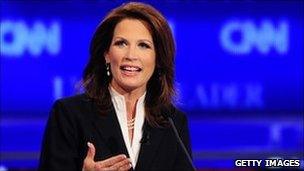
The Minnesota congresswoman, a favourite of the Tea Party, used the first televised debate in New Hampshire to formally announce that she was entering the contest.
She is an outspoken conservative who has been spending time in the early primary states.
The fiery Ms Bachmann has a small core of staunch support, although wider momentum behind her has slowed since she won the influential Iowa Straw Poll in August.
The Iowa-born 55-year-old has a law degree and worked as a tax attorney, and she has fostered 23 children.
Jon Huntsman
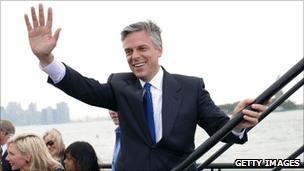
The former governor of Utah joined the race for the Republican presidential nomination with a distinct, if awkward, qualification: he worked for the other side.
As ambassador to China for two years under President Barack Obama, he has arguably the most foreign policy expertise of the Republican field.
But it remains to be seen whether or not that experience - which he defends as loyal service to the country rather than the president's policies - will be an advantage to Mr Huntsman in his bid to succeed the man who appointed him.
Jon Huntsman, 51, is the motorcycle-driving son of billionaire Jon Huntsman Sr, who founded a large chemical manufacturer.
He dropped out of high school to play keyboard in a rock band, later finishing school and graduating from the University of Pennsylvania. He also served as a Mormon missionary in Taiwan, and is said to speak fluent Mandarin.
His tone has been markedly more moderate than that of his rivals, and he has in the past backed civil unions for same-sex couples and said he believes in the science of climate change.
Since he spent the last two years outside the country, he must now introduce himself to Republican voters who have been steeped in the angry, stridently anti-government Tea Party movement.
Some analysts have suggested Mr Huntsman aims to be the adult in the race, rejecting his rivals' crowd-pleasing attacks on Mr Obama while counselling the US must make hard choices to rein in the national debt.
Mr Huntsman's ratings have languished in single-digits in opinion polls and he has not campaigned in the state of Iowa, preferring instead to focus on another key battleground, New Hampshire, also the heartland of Mitt Romney's support base.
It remains to be seen whether, after four years of Mr Obama in the White House, Mr Huntsman will satisfy voters.